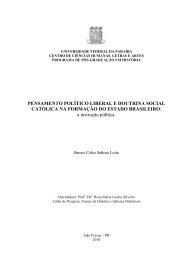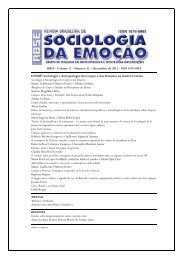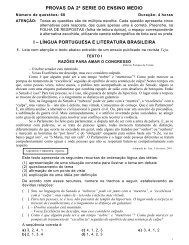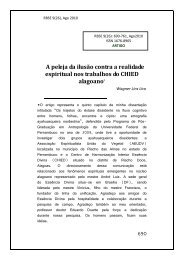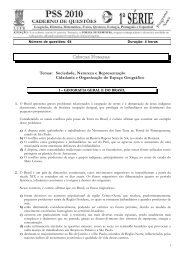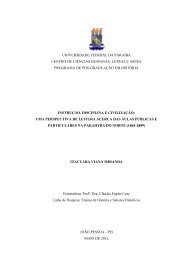abril de 2004 - CCHLA - Universidade Federal da ParaÃba
abril de 2004 - CCHLA - Universidade Federal da ParaÃba
abril de 2004 - CCHLA - Universidade Federal da ParaÃba
You also want an ePaper? Increase the reach of your titles
YUMPU automatically turns print PDFs into web optimized ePapers that Google loves.
Generated by Foxit PDF Creator © Foxit Softwarehttp://www.foxitsoftware.com For evaluation only.SOLOMON, Robert. 1981 Love: emotion, myth, and metaphor. Gar<strong>de</strong>nCity, N.Y.: Anchor Press/Double<strong>da</strong>y.SOLOMON, Robert. 1992. About Love: Re-inventing Romance for ourTimes. Lanham, Md.: Littlefield A<strong>da</strong>ms.STARRIN, B, Rantakeisu, U, Forsberg, E & Kalan<strong>de</strong>r-Blomqvist, M.2000. Un<strong>de</strong>rstanding the Health Consequences of Unemployment: TheFinance/Shame mo<strong>de</strong>l. In Kieselbach, T (Ed.) Youth Unemploymentand Health - A Comparison of Six European Countries. Leske +Budrich. Opla-<strong>de</strong>n.STARRIN, B, Rantakeisu, U & Hagquist, C. 1997. In the wake of therecession - economic hardship, shame and social erosion. ScandinavianJournal of Work and Environment, 23, 47-54.STARRIN, B, Jönsson, L R & Rantakeisu, U. 2000. Unemployment andsense of coherence. International Journal of SocialWelfare. 10, 107-116.TANGNEY, June, and Ron<strong>da</strong> Dearing. Shame and Guilt. 2002. NewYork: Guilford.Footnotes[1]For a recent analysis of what seems to be a parallel i<strong>de</strong>a,ritualization, see Knottnerus 1997.[2] The physicist Boltzmann first noticed this problem. When a newmethod gets results, many scientists become wed<strong>de</strong>d to it, coming “tobelieve that the <strong>de</strong>velopment of science to the end of all time wouldconsist in the automatic and unremitting application of it “ (Boltzmann1899).[3] Ross and Nesbitt (1991) did somewhat better with their study of thethe Fun<strong>da</strong>mental Attribution Error (FAE). They cite many studies ofEnglish-speaking subjects that show a preference subjects have forexplaining motives in terms of characteristics of the person, ratherthan the situation. However, they manage to cite one study of Hindusubjects. These subjects didn’t privilege personal explanations oversituational ones. Perhaps the FAE is not so fun<strong>da</strong>mental after all, butonly a characteristic that differentiates between mo<strong>de</strong>rn and traditionalcultures. Mo<strong>de</strong>rn cultures are ruthlessly individualistic, and traditionalones just as ruthlessly social.[4] According to Ekman (1998, p. 38): “‘I have not published myfindings on shame [that it is universal], but they are very welldocumented in my work among the South Fore of Papua New Guinea[1967-68].” One won<strong>de</strong>rs why these findings didn’t keep him fromexcluding shame from the facial emotion test he and Friesen (1972)<strong>de</strong>veloped, and why it took him 30 years to mention them.[5] Forthcoming128



